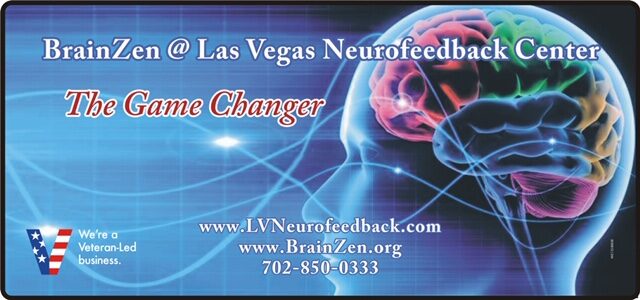Train Your Brain, Change Your Life:
Applied Neuroscience teaches us how to reach our Maximum Potential
Peak Performance Brain-training is the result of over 40-years of research in Brain Function in the fields of neurology, psychiatry, sports performance, and many other related fields. The greatest body of evidence of efficient brain functioning comes from the field of psycho-physiologically, especially the implications of the electrical system of the brain.
We know that everything we think, say, feel, and do – and more importantly How we think, say, feel, and do, is a direct product of the chemical/electrical reaction we know as neurotransmission. The chemical side, of course, involves neurotransmitters. Seratonin, GABA, Dopamine, to name a few. The electrical side, million of brain cells involved in the neurotransmission process, results in brain-waves that drive both the what and how of our cognitive and emotional processes. When this reaction is well regulated, usually great mental wellness occurs. When dysregulated, many obstacles to great mental wellness start to appear. Symptoms that make it more difficult to pay attention, focus, manage impulsiveness, socialize, and have great emotional balance.
Neurofeedback brain-training is a safe, effective, non-invasive training method that helps restore the brain’s electrical system to it’s best balance. Obviously, it is an important tool for those whose brain’s are more dysregulated then peak-performers. The science behind it’s effectiveness for a broad-range of mental health issues is both fascinating, and revelatory, with implications on so many issues that can be resolved by broader-based brain-training approaches.
Neurofeedback Brain-training’s use in athletic, artistic, leadership, management, and performance improvement is growing just as exponentially as it’s use in mental health systems. We have used brain-training at the Las Vegas Neurofeedback to train several peak performers, including a world-lightweight kick-boxing champion, tennis players, college athletes, poker players, golfers and many CEO’s, attorney’s and leaders in the community, business, and financial sectors.
Brain-training address the high levels of long-term stress experienced by many peak-performers, promoting stress recovery and improving sleep quality. Professional athletes and artists brain-train to improve ability to be in the zone, tune out distractions, increase processing speed, and improving focus on task-at-hand. Significantly, peak-performer brain-trainers report increased motivation, concentration, and ability to better manage emotions in high-pressure situations.
Neurofeedback brain-training is quickly becoming the peak-performer training standard in all levels of sports and athletic performance, artistic performers, and leaders in the business community.
NBA All-Star Chris Kaman Overcomes Anxiety Via Neurofeedback
 NBA All-Star Chris Kaman openly discusses his ADHD misdiagnosis and how neurofeedback helped him conquer anxiety. After his neurofeedback training, Kaman had his BEST season ever and was ranked among the league leaders in rebounds, blocked shots, and "double-doubles," per Jim Robbins' A Symphony in the Brain.
NBA All-Star Chris Kaman openly discusses his ADHD misdiagnosis and how neurofeedback helped him conquer anxiety. After his neurofeedback training, Kaman had his BEST season ever and was ranked among the league leaders in rebounds, blocked shots, and "double-doubles," per Jim Robbins' A Symphony in the Brain.
Canadian Olympic Soccer Team Brain-Trains with BrainPaint
Lauren Sesselmann, whose Canadian Olympic soccer team captured a bronze medal at the 2012 Summer Games in London, shares her perspective on neurofeedback: while physical prowess is vital to success, one's mental game might play an even bigger part in success. In this Reuters article, she attributes much of their success to her team's BrainPaint brain training.
Olympian mind games the everyday exerciser can play
Olympic Medalist Hannah Teter Turns to BrainPaint for Peak Performance
Hannah Teter underwent BrainPaint brain training leading up to the 2010 Winter Olympic Games in Vancouver, Canada, where she won silver in the halfpipe.
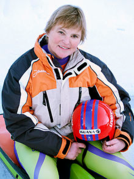 Olympic Athlete Anne Abernathy aka "Grandma Luge" Defies Odds,
Olympic Athlete Anne Abernathy aka "Grandma Luge" Defies Odds,
Recovering from Severe Head Trauma with Help from Neurofeedback
Olympic luge competitor, Anne Abernathy, experienced debilitating brain injuries in a severe 2001 accident during competition -- only one year before the Olympics -- leaving her hopes for a 5th Olympic games crushed. Suffering from seizures, episodic losses of consciousness, and a loss of three years of her memory, Anne faced the dim prospect of years of treatment as well as medication to help her in her recovery process. Always the competitor, she knew there had to be a way to recover faster and more fully. That's when she turned to neurofeedback.
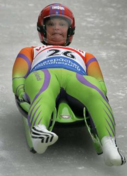 Defying all odds, ONLY 11 months later at 52-years-young, Anne competed in her 5th Olympics; something she was told she would never be able to do. In the 2002 Olympics, she placed 26th overall in women's luge and set two records: 1) she became the oldest female Olympic athlete, and 2) she had the most Olympic appearances by a female athlete.
Defying all odds, ONLY 11 months later at 52-years-young, Anne competed in her 5th Olympics; something she was told she would never be able to do. In the 2002 Olympics, she placed 26th overall in women's luge and set two records: 1) she became the oldest female Olympic athlete, and 2) she had the most Olympic appearances by a female athlete.
Hermann "The Herminator" Maier Swears by Neurofeedback
The most successful male Austrian skier ever--winning 54 World Cup races with 96 podium placements--Maier experienced a dramatic improvement in his athletic performance as a result of neurofeedback. He not only won the overall World Cup four times--1998, 2000, 2001 and 2004--but he also won two Olympic gold medals in the 1998 Winter Olympics at Nagano as well as silver & bronze medals in the 2006 Torino Winter Games.
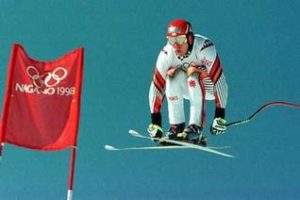
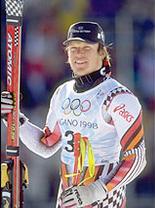
Top Beach Volleyball Player in the World Stays at the Top with Neurofeedback
Paired up with Misty May-Treanor, Kerri Walsh-Jennings won Olympic gold in beach volleyball at the 2004, 2008 and 2012 Summer Olympic Games, and is known as one of the best players to ever compete in the sport. She credits neurofeedback with helping her keep her competitive edge.
Mental, Physical Training for Olympic Volleyball
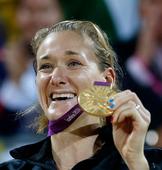
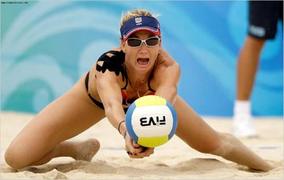
More High-Level Athletes Who've Amped Up Their Performance with Neurofeedback
- C Milan football club has introduced their mind room including neurofeedback training since 2006, and based on their World Cup win it was adopted by Real Madrid. Chelsea began using it in 2009.
- Denver Broncos: AFL Division Leaders 2014 & Superbowl Champions 2016
- New York Giants: Superbowl Champs 2008 & 2012
- Chicago Bears: NFL Division Leaders 2007
- New Zealand All Blacks trained with BrainPaint: Rugby World Cup 2008
- Alexandre Bilodeau--the Canadian men’s mogul champion who won Olympic gold in 2010 & 2014--credited his gold medal to neurofeedback.
- The Canadian Olympic team used neurofeedback extensively in the 2010 Olympics in Vancouver.
- The Vancouver Canucks Men's Hockey Team--after a 20-year post-season drought--won the 2011 Stanley Cup championship; also, they're holders of the best regular season in the NHL in both the 2010-2011 and 2011-2012 seasons.
- The Italian National Men's Soccer Team won the 2006 FIFA World Cup.
- Jessica Hardy: 2012 U.S. Swim Team Olympic Gold Medalist
- Eric Shanteau: 2012 U.S. Swim Team Olympic Gold Medalist
- Tennis Player Mary Pierce: Winner of Four Grand Slam Titles
- Phil Mickelson: World Golf Hall of Famer
Other peak performers from these fields have used brain-training to improve performance
- The Pro golf circuit
- Formula 1 teams
- NASA astronaut training centre
- United States Olympic Training Center
- English Institute of Sport (Olympic Training Center)
- Canadian National Olympic Sports Centers
- Norwegian Olympic Training Center
- Taiwanese Olympic Team
- Singapore Olympic Sports Council
- US Special Forces and Navy Seals training
- United States Army's Centers for Enhanced Performance
- Wingate Institute of Sports & Physical Education, Israel
- Human Performance Institute, Australian Special Forces
- West Point Military Academy
